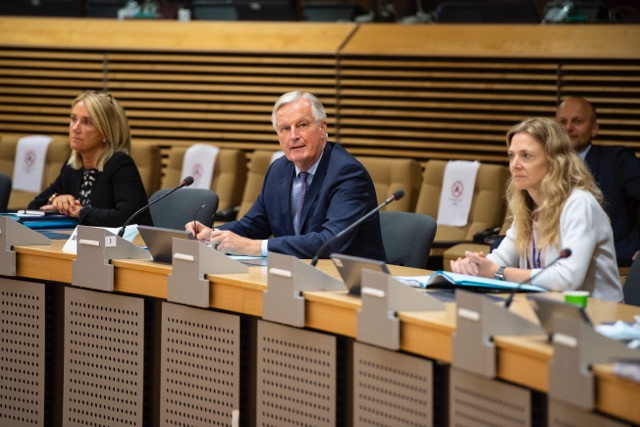At midnight on 30 June the chance of the UK requesting an extension to its one-year transition period for leaving the EU passed with little fanfare. Most mainstream news outlets in the UK did not make a big deal of the date, though the pro-Brexit Telegraph and Express seemed to take comfort in the surmounting of another possible hurdle. “The Government’s refusal to prolong negotiations is a victory for common sense,” wrote Telegraph columnist Liam Halligan. “Now we’re definitely leaving, in six months’ time, minds will focus and the haggling can begin in earnest.” The Express headlined its report, “Now they KNOW we're not bluffing!”
But both sides continued their belligerence on Tuesday, even if their statements did not match some of the braggadocio that has all too often blighted the negotiations. The main talking point was an agreement to complete assessments of the other’s regulatory regimes for financial services by deadline day. The EU’s chief negotiator, Michel Barnier, claimed that the UK had only responded to 4 of 28 questionnaires covering areas where equivalence assessments are possible. “So we are not there yet,” he said. But Britain’s Treasury said that the UK had been able to complete its own assessments on time. “And we are now ready to reach comprehensive findings of equivalence as soon as the EU is able to clarify its own position,” a spokesperson for the ministry said.
Divergence challenge
The Guardian reckons that British government is concerned that the EU will try to delay a decision on equivalence and the access of financial services until there is more clarity over the trade and security deal. Negotiations on the post-Brexit deal have been stepped up again, with the UK’s chief negotiator, David Frost, meeting Barnier face-to-face on Monday for the first time since before most of Europe was subject to lockdown and travel restrictions because of coronavirus.
British ambassador to Luxembourg, John Marshall, told Delano that the UK government has consistently said that there would be no extension. “Had we wanted to request one, the logical time to have done so would have been at the second meeting of the Withdrawal Agreement Joint Committee that met on 12 June by videoconference,” the ambassador said. “However we took the opportunity provided by this meeting to formally make clear the UK’s decision not to extend the transition period.”
Marshall added that the British government believes there is sufficient time between now and 31 December “to negotiate an FTA and agreements in a number of other areas, including fisheries and aviation. We hope the intensified schedule of talks that began this week will make genuine and rapid progress towards agreement.”
Barnier, however, appears to be in no mood to compromise and has said that what the UK has so far offered is “unacceptable” and that the there is no way member states, or the European Parliament would accept those terms. “Let us have no illusions: the UK will progressively start diverging from the EU framework. This is even one of the main purposes of Brexit,” he said on Tuesday. He urged the UK to brace for “big changes” on 1 January. “This should not come as a surprise to you. We have been warning you about this for the past three years.”
Swiss deal
Meanwhile, on Tuesday UK Chancellor Rishi Sunak and his Swiss counterpart Ueli Maurer signed a joint commitment to work on a new international financial services agreement. This followed a UK Treasury equivalence assessment of Switzerland in relation to Swiss stock markets. Speaking at the signing, which was done via video link, Sunak said: “Leaving the EU means we are now free to chart our own course, driven by our clear values as a financial centre: a safe and transparent place to do business, innovative markets that drive change for the better, and openness to the whole world.”
The Treasury says that details of the agreement will be discussed over the coming months ahead of the UK-Switzerland Economic & Financial dialogue in September.
